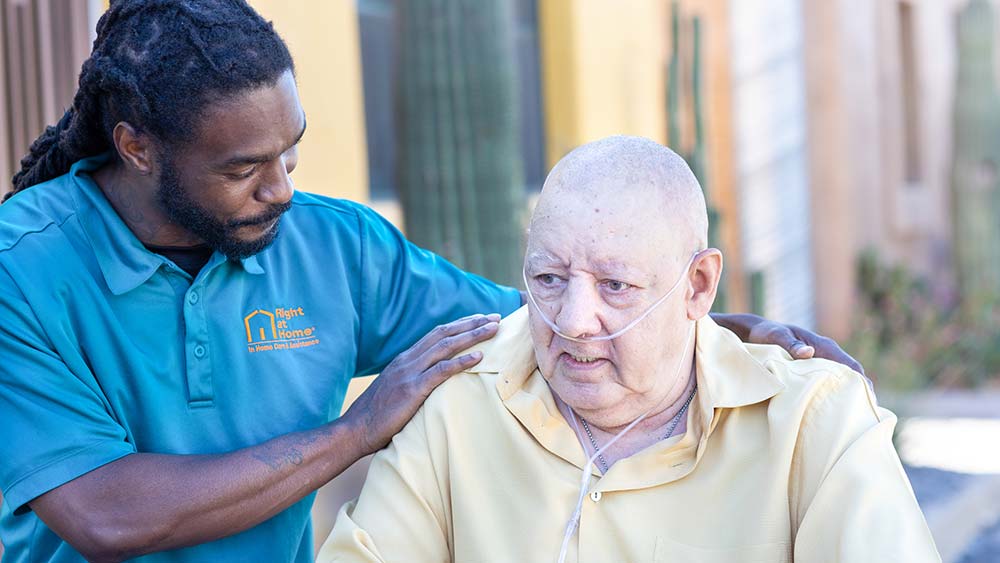

When Death Is Anticipated: How Family Caregivers Can Cope With a Loved One’s Progressive Illness
Perhaps you have a loved one who recently learned they have a progressive and ultimately fatal illness, such as cancer. Or you may have undergone your own life-changing health crisis. These are situations where we have advance notice of a death or a major change in our lifestyle. It is very natural that these experiences may cause us to feel anticipatory grief.
Anticipatory grief is the emotional response to the anticipated loss of a loved one, such as a spouse, parent or another close family member. It may also refer to the loss of a personal ability or identity. It is a normal and natural part of the grieving process. Symptoms of anticipatory grief may include:
- Sadness and feelings of hopelessness
- Anxiety and worry
- Anger or guilt
- Difficulty concentrating or making decisions
- Difficulty sleeping or eating
- Physical symptoms, such as fatigue or changes in appetite
We’ve all heard that everyone grieves differently—for example, one person might need to talk it through, while another may need time alone to process their feelings. The same is true for anticipatory grief. It also varies by culture, as we’ll discuss in a bit.
When Your Loved One Has Parkinson’s
April is Parkinson’s Awareness Month, and the nature of this progressive disease often causes anticipatory grief. Over time, a person with Parkinson’s will experience a decline in their physical abilities and maybe even cognitive abilities, which can be difficult for caregivers to witness. Of course, the patient will be coping with their own shock and grieving process. Caregivers may also experience anticipatory grief as they anticipate the loss of their loved one’s abilities.
If you are a caregiver for someone with Parkinson’s or a life-limiting illness like advanced heart disease, it may be helpful to:
- Allow yourself to feel your emotions. It is OK to feel a range of emotions, including sadness, anger, guilt and fear. Allow yourself to feel and express your emotions, rather than try to suppress them. It can be helpful to talk to a therapist or join a support group.
- Find ways to connect with your loved one. Spend quality time with your loved one, even if their ability to communicate has diminished. This can be a way to create meaningful connections and create lasting memories.
- Take care of yourself. It is important to prioritize your own well-being during this difficult time. Find ways to reduce stress, such as through self-care activities or doing things that bring you joy.
- Go easy on yourself. You are doing your best in an extraordinary situation. Try not to be ashamed if you experience a sense of relief when your loved one passes away. This is a perfectly normal reaction to your loss and the end of a long period of stress.
Cultural Responses to Anticipatory Grief
Like individuals, different cultures have varying ways of responding to anticipatory grief. Here are some examples:
In many Western cultures, such as the U.S. and Europe, individuals may try to cope with anticipatory grief by talking about their feelings with family members, friends, support groups, or faith communities. They may also seek counseling or therapy to help them manage their emotions.
In some Eastern cultures, such as China, individuals may not talk about their feelings openly, especially when it comes to death and grief. Instead, they may rely on rituals and ceremonies to cope with their emotions.
In some Indigenous cultures, such as Native American tribes, the community may come together to support individuals who are experiencing anticipatory grief. This may involve rituals or ceremonies, such as smudging, drumming or praying, to help individuals connect with their loved ones and find comfort in their spiritual beliefs.
In some Middle Eastern cultures, individuals may turn to religion to cope with anticipatory grief. For example, Muslims may recite the Quran, perform prayers, or make charitable donations in honor of their loved ones.
Of course, practices within cultures also vary.
Most of us have had or will have experiences that bring on anticipatory grief, and that is a normal part of life. As a grief therapist writes about the unique pain of anticipatory grief in an article on DeathCafe.com, “By opening ourselves to the reality of loss we free ourselves from the pain of resisting the loss.”
How Right at Home Can Help
Right at Home offers a free downloadable guide for grieving family caregivers called Understanding Grief. We also provide a wide range of services to help families caring for an elderly loved one. Contact your local Right at Home* and ask for a FREE in-home consultation.
*Home care services vary by location.







